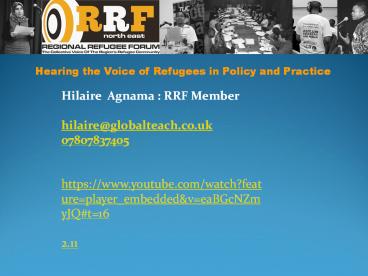Hearing the Voice of Refugees in Policy and Practice - PowerPoint PPT Presentation
Title:
Hearing the Voice of Refugees in Policy and Practice
Description:
Hearing the Voice of Refugees in Policy and Practice Hilaire Agnama : RRF Member hilaire_at_globalteach.co.uk 07807837405 https://www.youtube.com/watch?feature=player ... – PowerPoint PPT presentation
Number of Views:93
Avg rating:3.0/5.0
Title: Hearing the Voice of Refugees in Policy and Practice
1
Hearing the Voice of Refugees in Policy and
Practice
Hilaire Agnama RRF Member hilaire_at_globalteach.
co.uk 07807837405 https//www.youtube.com/watch?
featureplayer_embeddedveaBGcNZmyJQt16 2.11
2
Strategy
- (1)The first is to raise awareness of who we
really are and the situation we face - (2) The second level is to influence Policy
- (3) And the 3rd level is to influence the design
and delivery of Services, so that they are
accessible and effective
3
OLGAS STORY
4
Hearing the Voice of Refugees in Policy and
Practice
- Working with the School of Health and Social Care
Teesside University to help develop the
Pre-registration nursing curriculum and the
knowledge and skills of students - Aim To ensure that the service user perspective
- influences all aspects of the curriculum design
- to help students develop key interpersonal
skills and their understanding of person centred
care - to help students develop their understanding of
peoples health and nursing care needs and that
there is concentrated emphasis throughout the
programme on the core values of nursing and the
fundamentals of caring, compassion and
communication
5
Hearing the Voice of Refugees in Policy and
Practice
Knowledge or understanding of who an asylum
seeker /refugee is important in order to
provide effective care
6
- Some cultural beliefs and practices
- Female Genital Mutilation
- Oldest male seen as decision maker for family.
- Interest and honour of the family are more
important than those of individual family
members. - In some communities women are not to be seen by
male doctors or nurses. - Stigmatization will cause an individual not to
disclose symptoms of mental health or STDs. - In some communities eye contact is not
established as a sign of respect. - Preference for male child. (manifests itself in
neglect, deprivation and discriminatory treatment
of the girl child). - Personal health is a private affair in certain
communities. (disclosure is important so they can
get the help they need.)
.
7
- Patients are often willing to share their customs
with those who seek to understand them.
- In some communities use of Contraceptives is
forbidden leading to many unwanted pregnancies. - In some communities the extended family has
significant influence. - Mental behaviours that indicate lack of self
control will bring shame on family. - Patients will refrain / be reluctant to discuss
symptoms. - Injection ( some communities believe that unless
an injection is administered they have not been
treated properly. - Respect for authorities. (agree to treatment but
not follow). - Time Culture ( In some communities being late for
an appointment is not seen as a problem as long
as they turn up)
.
8
- Specific health needs presented by asylum seekers
and refugees that nurses needs to be aware of
- Many have physical problems that affects their
day to day life. - Anxiety and Depression
- Social Isolation as a result of separation from
families/children. - War and Imprisonment
- Physical and Sexual violence.
- Witnessing Violence to others.
- Traumatic Bereavement.
- Complications from injuries as a result of
torture and violence. - Female Genital Mutilation victims.
- HIV/AIDS
- Pregnant Women (Rape Victims).
- Starvation
- Genocide
- Victims of domestic and sexual abuse.
9
Hearing the Voice of Refugees in Policy and
Practice
VOICE EMPOWERMENT A Trans-national Network
Hearing the voices of Refugees in Policy and
Practice in the European Union for the European
Commission, 2000 Evidence shows that those who
are the target beneficiaries of a policy must be
a part of the process through which they receive
those benefits in order for that policy to be
effective.






























